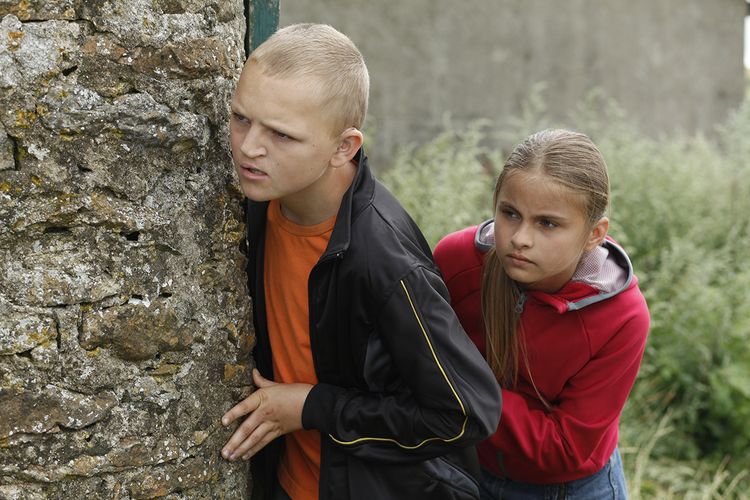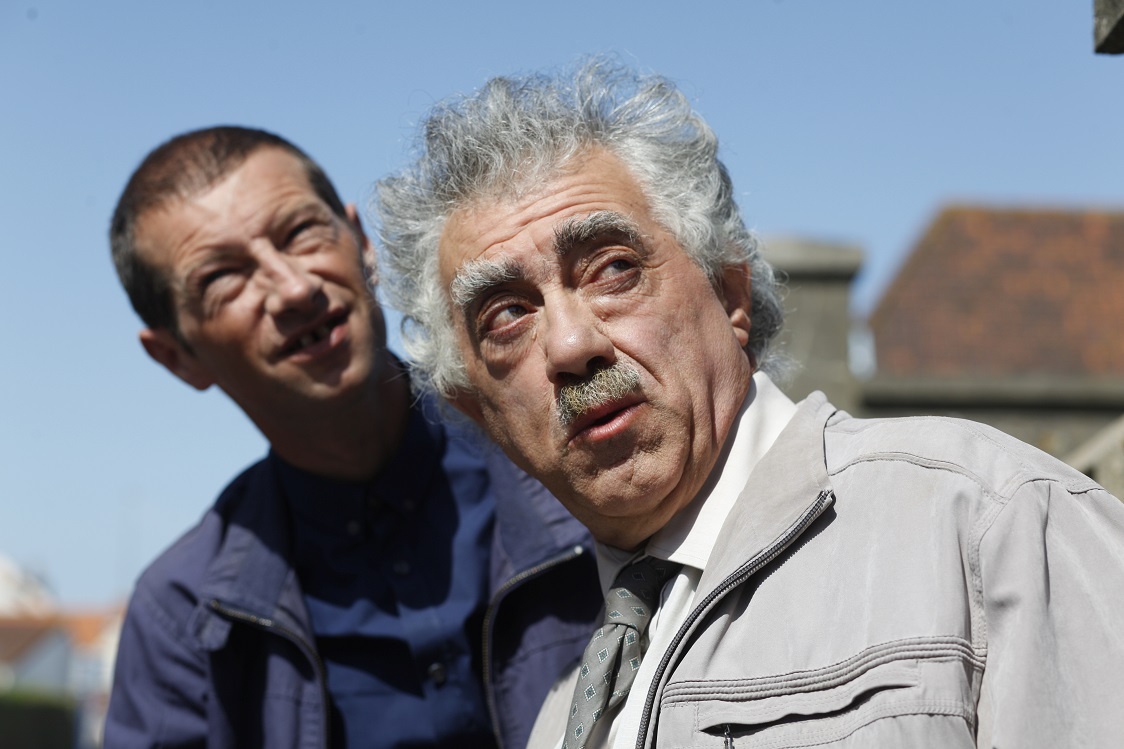P'tit Quinquin | reviews, news & interviews
P'tit Quinquin
P'tit Quinquin
Bruno Dumont's latest has a new, beguiling comedy

When least expected, comedy has come stumbling into the work of French auteur Bruno Dumont. In his seven films to date, from the Cannes-winning Humanité of 1999 through to the stark Camille Claudel 1915 from two years ago, the director, frequently working with non-professional actors, has marked out a distinctive territory defined by its bleakness and emotional intensity.
Which makes his latest, P’tit Quinquin, a departure indeed, both in mood and format. Though thematically the comedy is distinctly dark, its sense of the absurd is often laugh-out-loud funny, resulting in an ambiguous feeling that’s heightened by some of the physical characteristics of his cast. It’s a new direction in formal terms, too: made for television in four series (and originally broadcast in France in that form on ARTE), Quinquin nonetheless plays very naturally, at just under 200 minutes, as a consecutive story on the big screen (it debuted at the Cannes Film Festival last year).
Van der Weyden must surely acknowledge a debt to that other hapless French detective, 'Pink Panther'’s Inspector Clouseau
The links to Humanité are pronounced, on the surface at least, both in the crime mystery elements and police investigation narrative, and the setting in Dumont’s native Pas-de-Calais region of northern France. Quinquin takes place in the summer, which gives the flat, hardly conventional beauty of the landscape, with its quiet country roads and empty beaches, something of a halcyon feel (Guillaume Deffontaines’ loving widescreen cinematography certainly endorses such positive impressions). Nevertheless, we sense that this underpopulated farming area with its small town and scattered homesteads would be bleak in winter: some of the faces of its residents look like they’ve been buffeted by storms into almost gargoyle-like effigies.
 The face of the film’s eponymous hero (main picture), a completely winning role from Alane Delhaye, also seems somehow bruised by life: he could be a young prize-fighter, his hugely flexible physiognomy conveying the kid’s mood in details like the way the corners of his mouth turn up, and the quizzical frown that’s his most characteristic, and winning, expression. Quinquin’s just starting his holidays, which means the company of his girlfriend Eve (Lucy Caron, pictured above right with Delhaye) – they have a touchingly loyal affection which seems maturer than we might expect for their young years – and bicycling around with his gang of friends, investigating whatever’s going on.
The face of the film’s eponymous hero (main picture), a completely winning role from Alane Delhaye, also seems somehow bruised by life: he could be a young prize-fighter, his hugely flexible physiognomy conveying the kid’s mood in details like the way the corners of his mouth turn up, and the quizzical frown that’s his most characteristic, and winning, expression. Quinquin’s just starting his holidays, which means the company of his girlfriend Eve (Lucy Caron, pictured above right with Delhaye) – they have a touchingly loyal affection which seems maturer than we might expect for their young years – and bicycling around with his gang of friends, investigating whatever’s going on.
A fair amount of the first episode sets this leisurely scene, seen beguilingly through the children’s eyes, and Dumont doesn’t hurry to introduce the wider action. When he does, however, it’s in a way bound to attract the kids’ attention, with a dead cow being hoisted by helicopter out of the depths of a derelict World War Two bunker. The police are already on the scene, led by the inimitable double-act that is the film’s comic tour-de-force, Bernard Provost playing the voluble investigator Captain van der Weyden, Philippe Jore his taciturn sidekick lieutenant Carpentier (pictured below, Provost at right). Van der Weyden must surely acknowledge a debt to that other hapless French detective, Pink Panther’s Inspector Clouseau, and his involuntary facial contortions – he’s a ’tec with a tic – are frequently scene-stealers. His various portentous utterances (he has a distinctly Zola-esque tendency to see the hand of the Devil everywhere, a longterm preoccupation of Dumont, too) are no less laconic.
 There’s nothing comic in the crimes they’re investigating, however: the first two murders involve human body parts stuffed into dead cows’ innards, and later ones are hardly more photogenic. It becomes clear that there’s something very dark in this rural community, though its exact location remains tantalisingly concealed; this gang of children has no Famous Five-style innocence either, and Quinquin reveals himself on occasions a pugnacious little tyke who’s no stranger to racism (nor indeed are the policemen). That becomes clearest in the fourth series, in which the simmering conflicts between the town’s indigenous French inhabitants and those who have arrived there from further afield culminate in a shocking incident of the kind that we’ve seen rather many of recently in France.
There’s nothing comic in the crimes they’re investigating, however: the first two murders involve human body parts stuffed into dead cows’ innards, and later ones are hardly more photogenic. It becomes clear that there’s something very dark in this rural community, though its exact location remains tantalisingly concealed; this gang of children has no Famous Five-style innocence either, and Quinquin reveals himself on occasions a pugnacious little tyke who’s no stranger to racism (nor indeed are the policemen). That becomes clearest in the fourth series, in which the simmering conflicts between the town’s indigenous French inhabitants and those who have arrived there from further afield culminate in a shocking incident of the kind that we’ve seen rather many of recently in France.
Dumont plays ironically with the expectations of the detective genre, subverting them nicely (and earning the director comparisons with David Lynch and Twin Peaks), while the series format also gives him extra length to let scenes run longer, not for any narrative purpose but instead for frequently surreal development of theme and character. There’s a prolonged early funeral service that’s rich in unalleviated eccentricity, its humour qualified by our wondering whether Dumont is exploiting the real-life mental peculiarities of his cast (finally, I think, he doesn’t), while the scene of the town’s Bastille Day celebrations has viewers simultaneously laughing at proceedings and strangely touched by their underlying humanity. Dumont has a palpable relish for everything (and everyone) to which his script introduces us which is infectious, while leaving it up to viewers to qualify its underlying complexities.
Overleaf: watch the trailer for P'tit Quinquin
rating
Share this article
The future of Arts Journalism
You can stop theartsdesk.com closing!
We urgently need financing to survive. Our fundraising drive has thus far raised £49,000 but we need to reach £100,000 or we will be forced to close. Please contribute here: https://gofund.me/c3f6033d
And if you can forward this information to anyone who might assist, we’d be grateful.

Subscribe to theartsdesk.com
Thank you for continuing to read our work on theartsdesk.com. For unlimited access to every article in its entirety, including our archive of more than 15,000 pieces, we're asking for £5 per month or £40 per year. We feel it's a very good deal, and hope you do too.
To take a subscription now simply click here.
And if you're looking for that extra gift for a friend or family member, why not treat them to a theartsdesk.com gift subscription?
more Film
 Can I get a Witness? review - time to die before you get old
Ann Marie Fleming directs Sandra Oh in dystopian fantasy that fails to ignite
Can I get a Witness? review - time to die before you get old
Ann Marie Fleming directs Sandra Oh in dystopian fantasy that fails to ignite
 Happyend review - the kids are never alright
In this futuristic blackboard jungle everything is a bit too manicured
Happyend review - the kids are never alright
In this futuristic blackboard jungle everything is a bit too manicured
 Robert Redford (1936-2025)
The star was more admired within the screen trade than by the critics
Robert Redford (1936-2025)
The star was more admired within the screen trade than by the critics
 Blu-ray: The Sons of Great Bear
DEFA's first 'Red Western': a revisionist take on colonial expansion
Blu-ray: The Sons of Great Bear
DEFA's first 'Red Western': a revisionist take on colonial expansion
 Spinal Tap II: The End Continues review - comedy rock band fails to revive past glories
Belated satirical sequel runs out of gas
Spinal Tap II: The End Continues review - comedy rock band fails to revive past glories
Belated satirical sequel runs out of gas
 Downton Abbey: The Grand Finale review - an attemptedly elegiac final chapter haunted by its past
Noel Coward is a welcome visitor to the insular world of the hit series
Downton Abbey: The Grand Finale review - an attemptedly elegiac final chapter haunted by its past
Noel Coward is a welcome visitor to the insular world of the hit series
 Islands review - sunshine noir serves an ace
Sam Riley is the holiday resort tennis pro in over his head
Islands review - sunshine noir serves an ace
Sam Riley is the holiday resort tennis pro in over his head
 theartsdesk Q&A: actor Sam Riley on playing a washed-up loner in the thriller 'Islands'
The actor discusses his love of self-destructive characters and the problem with fame
theartsdesk Q&A: actor Sam Riley on playing a washed-up loner in the thriller 'Islands'
The actor discusses his love of self-destructive characters and the problem with fame
 Honey Don’t! review - film noir in the bright sun
A Coen brother with a blood-simple gumshoe caper
Honey Don’t! review - film noir in the bright sun
A Coen brother with a blood-simple gumshoe caper
 The Courageous review - Ophélia Kolb excels as a single mother on the edge
Jasmin Gordon's directorial debut features strong performances but leaves too much unexplained
The Courageous review - Ophélia Kolb excels as a single mother on the edge
Jasmin Gordon's directorial debut features strong performances but leaves too much unexplained
 Blu-ray: The Graduate
Post #MeToo, can Mike Nichols' second feature still lay claim to Classic Film status?
Blu-ray: The Graduate
Post #MeToo, can Mike Nichols' second feature still lay claim to Classic Film status?

Add comment